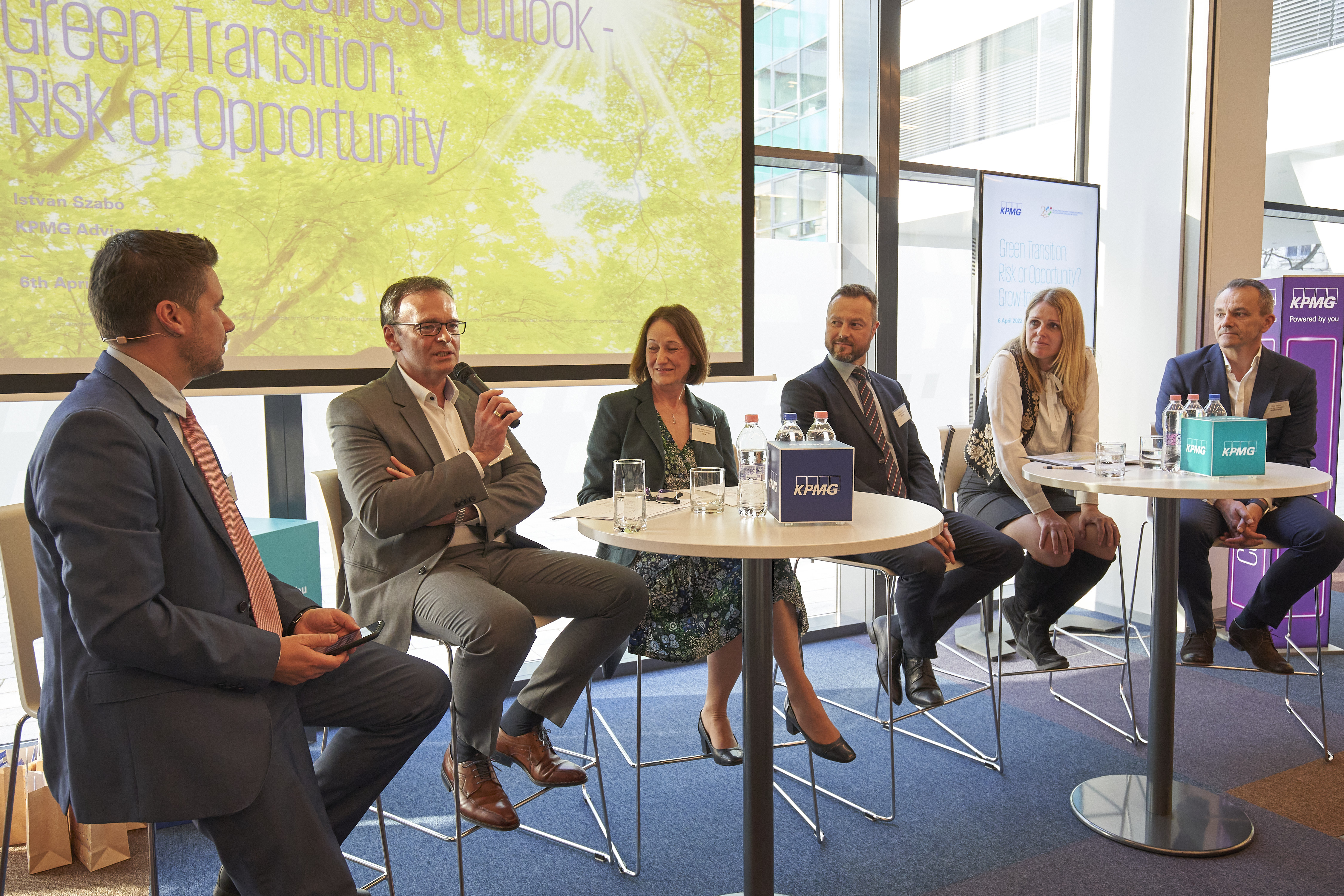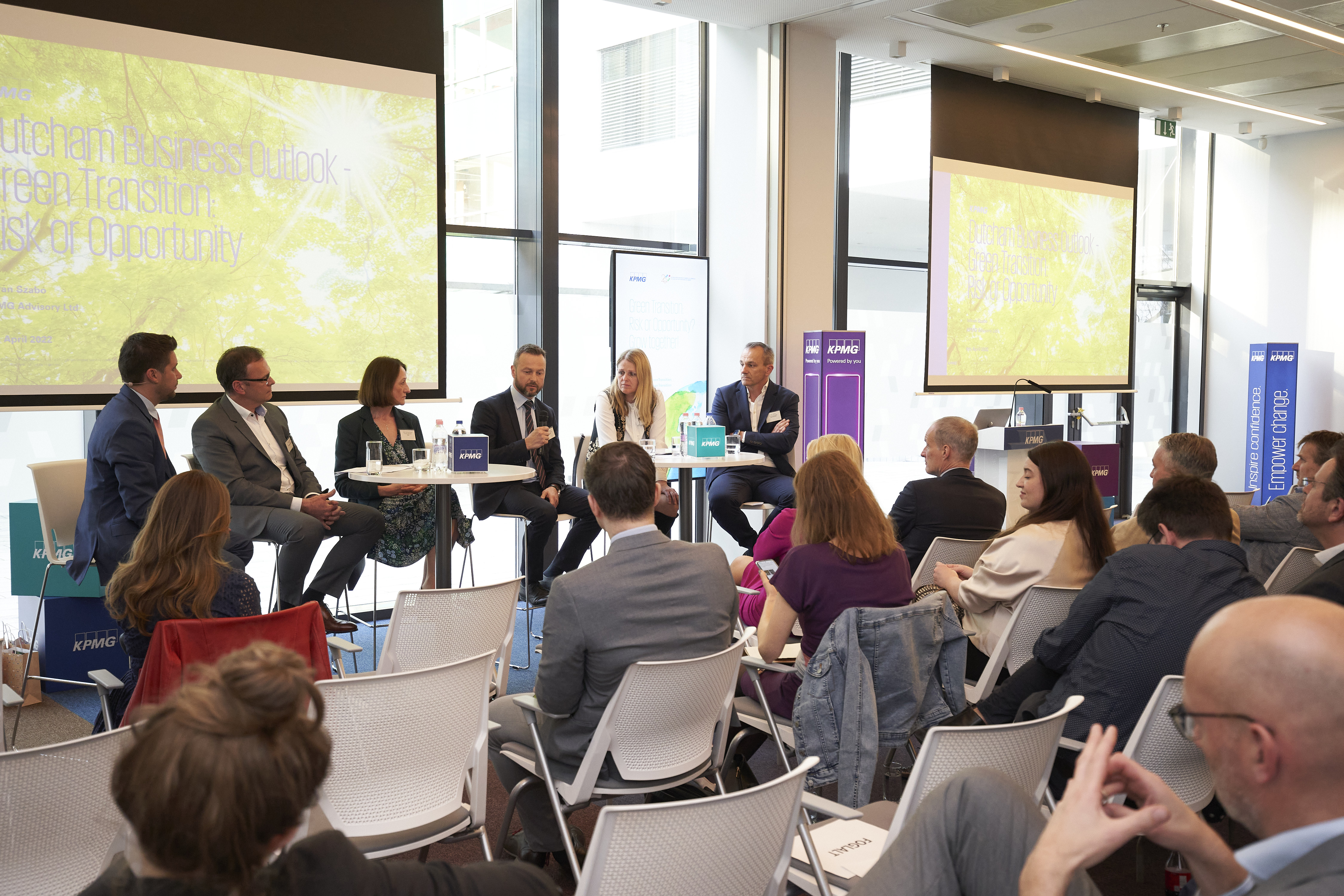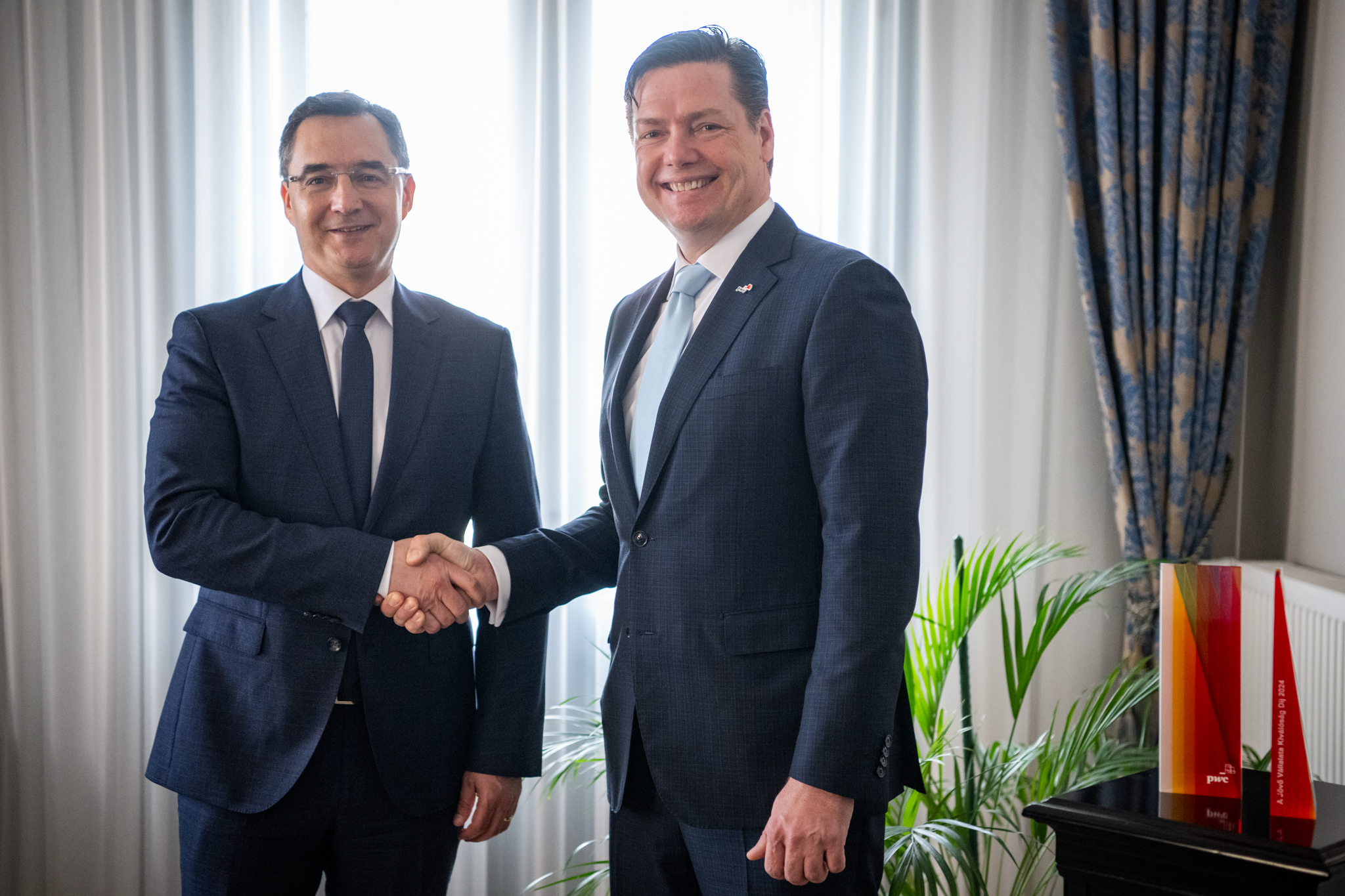Driving the green transition

From left: István Szabó, director and CEE head of sustainability at KPMG Hungary; Péter Szautner, FrieslandCampina Hungaria Zrt.; Ildikó McPartlin-Kiss, Air France-KLM; Attila Fésűs, ENGIE Magyarország Kft.; Deputy Secretary of State for Climate Policy Barbara Botos; and Tibor Bodor, ING Bank Hungary.
Photo by Alfred Schmidt, www.studiogo.hu
Despite the numerous immediate challenges the business world currently faces, it is essential the focus remains on the green transition, both from business and climate change perspectives, a Dutcham conference has been told.
With the war in Ukraine taking up so much of the news agenda, the Netherlands-Hungarian Chamber of Commerce agreed that whatever happens in the present should not stop plans to ensure a better future for ourselves and the next generations, Andrea Bujdosó, a Dutcham board member, said in her opening words at the Dutcham Business Outlook event Green Transition: Risk or Opportunity, organized with KPMG on April 6.
Dutch Ambassador to Hungary Désirée Bonis emphasized in her welcoming remarks that going green was a question anymore “but the only way to go forward.” The “take-make-waste” approach had been a lucrative business model in the past but is exhausting nature’s resources. We have moved closer to the planet’s limits, and “while in the past the economy has shaped our environment, now the environment will shape our economy,” she said.
Future markets will face several risks which are already emerging, such as raw material scarcity, supply chain inefficiency, and bans on international waste. To minimize the effects of these challenges, the Netherlands aims to transform into a fully circular economy by 2050.
Today, 25% of the Dutch economy relies on recycled raw materials. The number in Hungary is less than 7%, but that offers many business opportunities, Bonis said. To develop partnerships between Dutch and Hungarian companies, the embassy is organizing a Dutch circular economy business delegation visit to Hungary in late June, she explained.
Climate change presents a now or never moment. Innovation and well-designed policies can still contribute to concrete climate actions bringing down fossil fuel demands, transforming cities into green and smart communities, and heralding the use of sustainable solutions for green mobility, the ambassador argued.
Mitigating climate risk
István Szabó, director and CEE head of sustainability at KPMG Hungary, the event’s host, highlighted how the risks of climate change would escalate quickly, causing irreversible environmental and significant economic impacts (even close to 20% damage to the global economy). Mitigating that, he spoke of sustainable financial opportunities expanding globally, how the EU is accelerating its sustainability ambition, and the most critical regulatory trends to focus on: EU Taxonomy, the Non-Financial Reporting Directive (NFRD), the Corporate Sustainability Reporting Directive (CSRD) and the Sustainable Finance Disclosure Regulation (SFDR).
“These will have direct and indirect impacts on the local companies, so this is high time to be prepared to mitigate risks and grasp the related opportunities at the same time,” Szabó said. A sustainability strategy and disclosure is not a “nice-to-have; it is a must-have […] because it matters. There is no Planet B,” he highlighted.
Szabó also led a panel discussion featuring: Péter Szautner, managing director at FrieslandCampina Hungaria Zrt.; Ildikó McPartlin-Kiss, country sales manager for Hungary and Balkans at Air France-KLM; Attila Fésűs, managing director of ENGIE Magyarország Kft.; Deputy Secretary of State for Climate Policy Barbara Botos of the Ministry of Innovation and Technology; and Tibor Bodor, CEO of ING Bank Hungary.
The panelists all agreed that consistent regulation would be the most significant driver behind the realization and acceleration of the global green business transition.

Photo by Alfred Schmidt, www.studiogo.hu
Ildikó McPartlin-Kiss highlighted that the Air France–KLM group had secured a top-three position in the Dow Jones Sustainability Index for the last 16 years. But the sector can only be successful if all parties, the government, and the customer, work together, she said.
Since January 2022, KLM has added 0.5% sustainable aviation fuel (SAF) to flights departing from Amsterdam. She said that replacing fossil kerosene with SAF can reduce CO2 emissions by at least 75%. Limiting that, though, there is little SAF production capacity available globally, which means the green fuel is at least four times more expensive than regular kerosene. There is so little demand because of the high prices, meaning production capacity doesn’t scale up. A strong demand signal is needed from the aviation industry to break this impasse and provide the incentive for SAF production to scale up and for prices to come down.
KLM aims to use 10% SAF by 2030 and has partnered with SkyNRG to build the biggest dedicated SAF plant in Europe, McPartlin-Kiss said.
Péter Szautner said that FrieslandCampina, a 150-year-old dairy cooperative company, has always invested in the future. It has introduced a “Nourishing a Better Planet” program to prioritize commitments such as a positive impact on farmers and society, creating a sustainable supply chain, providing better, more affordable nutrition, and decreasing its carbon footprint. It has a zero-landfill goal, for example: everything will be recycled. Szautner believes EU policies will force market players to place much closer attention on green agriculture. Providing the essential infrastructure for selective waste collection, for example, is the responsibility of the state to “produce” recycled materials in the quantity and quality necessary for green food packaging, he argued.
Barbara Botos pointed out that the world is challenged by a constellation of crises: climate change, loss of biodiversity, COVID-19, geopolitical tensions, and an energy crisis. Hungary is at half-time in its net-zero journey, she said. The country had already achieved 34% greenhouse gas emission reduction towards climate neutrality, above the European average, but the remaining 66% has to be delivered in less than 28 years by 2050. An annual 4.8% of the GDP is to be devoted to this goal, Botos said.
Attila Fésűs said cost is a fundamental driver of the energy transition. The high energy prices are escalating the interest and need for more sustainable and affordable energy solutions and consumption. Engie’s long-term ambition is to achieve net-zero operations by 2050, replacing natural gas with green gas or hydrogen. Fighting gas dependency is accelerating the switch to green solutions: clients are looking to reduce energy consumption by modernizing their technologies or optimizing energy needs.
Tibor Bodor stated that if the green transition is to be made faster and more efficient, the financial benefits of such systemic change must be supported by governments even more. ING is already steering hundreds of billions of euros in its lending portfolio towards meeting net-zero climate goals in what it calls a Terra approach, focusing on the nine most polluting industries. The bank has stopped financing coal and is planning changes in its oil and gas investments to help companies change their behavior and has committed to increasing its lending for renewables.
The panelists also shared their personal commitments toward more sustainable living, such as cycling to client visits or dropping single-use plastic, but said the most significant step was the example shown to colleagues and clients since it is a moral obligation of CEOs to be role models.
SUPPORT THE BUDAPEST BUSINESS JOURNAL
Producing journalism that is worthy of the name is a costly business. For 27 years, the publishers, editors and reporters of the Budapest Business Journal have striven to bring you business news that works, information that you can trust, that is factual, accurate and presented without fear or favor.
Newspaper organizations across the globe have struggled to find a business model that allows them to continue to excel, without compromising their ability to perform. Most recently, some have experimented with the idea of involving their most important stakeholders, their readers.
We would like to offer that same opportunity to our readers. We would like to invite you to help us deliver the quality business journalism you require. Hit our Support the BBJ button and you can choose the how much and how often you send us your contributions.









